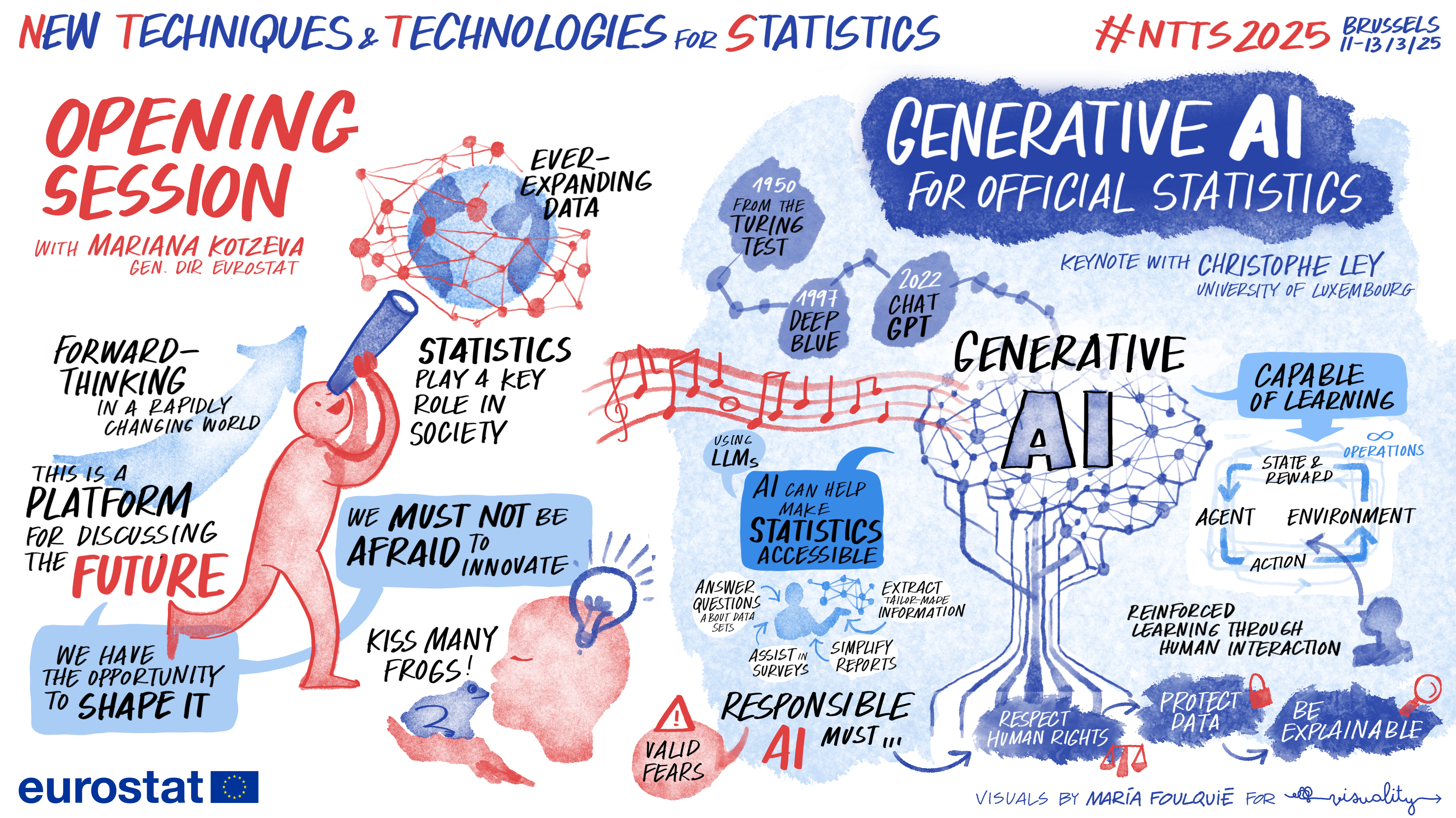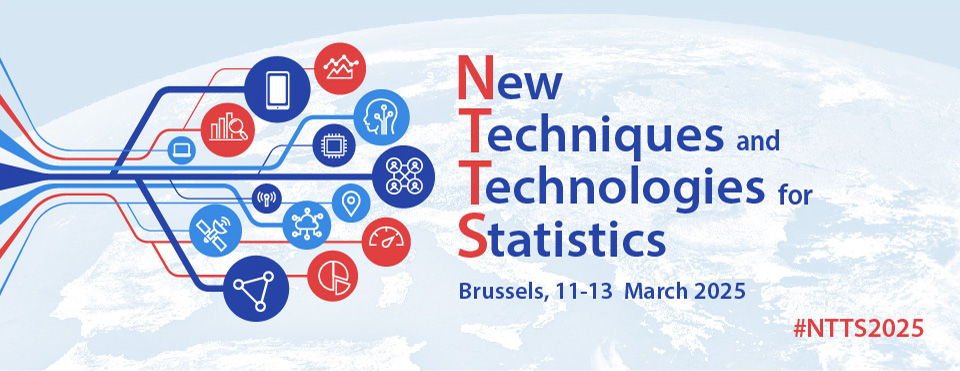
EBOOKLET NTTS2025
LINKS TO THE WEB STREAMING
10.03.2025:
https://webcast.ec.europa.eu/ntts-2025-conference-mans-2025-03-10
11.03.2025:
JENK: https://webcast.ec.europa.eu/ntts-2025-conference-jenk-2025-03-11
MANS: https://webcast.ec.europa.eu/ntts-2025-conference-mans-2025-03-11
GASP: https://webcast.ec.europa.eu/ntts-2025-conference-gasp-2025-03-11
12.03.2025:
JENK: https://webcast.ec.europa.eu/ntts-2025-conference-jenk-2025-03-12
MANS: https://webcast.ec.europa.eu/ntts-2025-conference-mans-2025-03-12
GASP: https://webcast.ec.europa.eu/ntts-2025-conference-gasp-2025-03-12
13.03.2025:
JENK: https://webcast.ec.europa.eu/ntts-2025-conference-jenk-2025-03-13
MANS: https://webcast.ec.europa.eu/ntts-2025-conference-mans-2025-03-13
GASP: https://webcast.ec.europa.eu/ntts-2025-conference-gasp-2025-03-13
14.03.2025:
JENK: https://webcast.ec.europa.eu/ntts-2025-conference-jenk-2025-03-14
WHAT IS NTTS?
New Techniques and Technologies for Statistics (NTTS) is an international biennial scientific conference series, organized by Eurostat, on new techniques and methods for official statistics, and the impact of new technologies on statistical collection, production and dissemination systems.
The purpose of the conference is both to allow the presentation of results from currently ongoing research and innovation projects in official statistics, and to stimulate and facilitate the preparation of new innovative projects with the aim of enhancing the quality and usefulness of official statistics.
The NTTS conference series was initially triennial, and with the conference taking place in 1992 (Bonn), 1995 (Bonn), 1998 (Sorrento) and 2001 (Hersonissos, Crete). After a break of 8 years, the conference was re-launched on a biannual basis, and took place in Brussels in 2009, 2011, 2013, 2015 2017 and 2019. NTTS 2021 was fully virtual, whereas NTTS 2023 took place in Brussels.
NTTS 2025 will be hosted again in Brussels in the Charlemagne Building.
NTTS 2025 OUTLINE PROGRAMME
EARTH OBSERVATION WORKSHOP
Workshop on Earth Observation and official statistics
NTTS2025 Satellite Event on Friday, March 14th, 2025, 9:00 - 13:00 in Brussels, Belgium
In recent years, National Statistic Institutes have increasingly searched for new data sources in order to produce statistics more efficient, faster and more frequently. The Warsaw memorandum from 2021 signed by the National Statistical institutes underlined the ambition to use Earth Observation data as a new data source for official statistics.
Capacity building for EO data for official statistics is regarded as a key component of this ambition. As part of this ambition and as part of the work for the GEOS2023 grant, we now organize a workshop on the application of Earth Observation data for official statistics.
EO data, like satellite and aerial images, are usually freely available. In addition, the spatial and temporal resolution of these images and type of observations, such as air pollutants, keeps increasing.
However, EO data is usually not collected with official statistics in mind and requires state-of-the-art techniques to be processed and refined into official statistics.
In this workshop we will be providing and using a simplified inventory of the Copernicus DataSpace ecosystem to acquaint the participants with the EO data sources that are available. In the workshop we then facilitate the participants to relate the earth observation data sources to potential applications in official statistics. The workshop will be setup in a way that applications of Earth Observation data for areas that the statistical community is already exploring (like land use, land cover, crop type and yield, sustainable energy) are discussed, but we also ask the participants of the workshop to relate those data sources to other statistical domains, like building sites, industry, sustainable development goals and water usage, to name a few. In the second part of the workshop the challenges that follow from these applications will be explored by the participants.
At the end of the workshop we hope that the participants and the organizers of the workshop provide the statistical and EO community with new insights on possible applications of (combinations of) EO data products in the field of official statistics, and some insight in the work that needs to be done to get there.
GUIDELINES FOR SPEAKER PRESENTATIONS
Presentation Format:
- Please prepare your presentation in PowerPoint (PPT) 16:9 (Widescreen) format. You are free to choose the template.
- The time allocated for your presentation is typically 10–15 minutes max.
- A Q&A session will take place at the end of each session.
- Given the time constraints, please avoid an excessive number of slides:
- 15 slides (with approximately 60 seconds per slide) is a recommended benchmark.
- While you may present without visual support, we encourage you to use PowerPoint.
Submission & Technical Setup:
- You must hand over your presentation to the conference assistants on the day of your session.
- Please arrive on time for the start of your session.
- Be present at the podium at least 10 minutes before your session begins.
- Presentations will be displayed using the conference room’s PC/laptop and will be automatically streamed online.
- Personal laptops cannot be used for presentations.
Live Streaming & Display:
- Your PowerPoint will be displayed in a "picture-in-picture" format alongside the live camera feed in the video stream.
- Please note that everything displayed on the PC's desktop will be broadcast live.
GUIDELINES FOR POSTER PRESENTATIONS
- Printing: Please note that posters must be printed by the presenters themselves.
- Format: While you are free to choose the format, the general recommendation is A0 size.
- Display: Posters can be displayed starting in the morning and may remain up until the end of the day. Please check the program to find out which day your poster presentation is scheduled.
- Interaction: During the lunch break, participants will have the opportunity to view the posters. This is a great chance for you to provide additional information about your abstract and engage with attendees.
LATEST NEWS
25.02.2025
The latest version of the Book of Abstracts for NTTS 2025 is now online!’
14.02.2025
The programme of NTTS2025 Satellite Event - Earth Observation (14.03) is now online.
05.02.2025
The detailed Programme is now online. Click on the following link to download it.
16.10.2024
The REGISTRATION is now open for NTTS 2025 and its side events. To secure your place at NTTS and its side events please fill in the form here before the 15th of February 2025.
Please note that in order to register it may be required to authenticate via EU Login. .
REGISTRATION
The REGISTRATION onsite are now CLOSED for NTTS 2025 and its side events.
The REGISTRATION online are still open via this link: click here.
Web streaming's link will be published soon.
HACKATHON SIDE EVENT
SPEAKERS
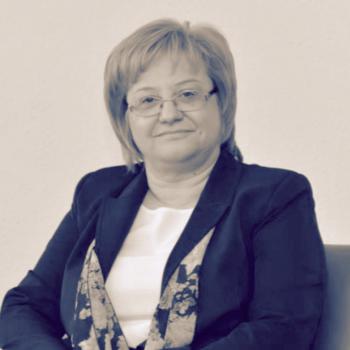
Mariana Kotzeva is Director-General of Eurostat from 1 January 2017. She joined Eurostat as a special adviser in 2012, becoming its Deputy Director-General in 2014. Prior to joining the European Commission, Ms Kotzeva was the Head of Bulgaria’s National Statistical Institute. She also held a number of high-level consulting posts in the Bulgarian and foreign administrations, and led international projects for the United Nations and the World Bank. She has a Master's degree in economics and a PhD in Statistics and Econometrics. She is an Associate Professor of Statistics at the University of National and World Economy in Sofia.
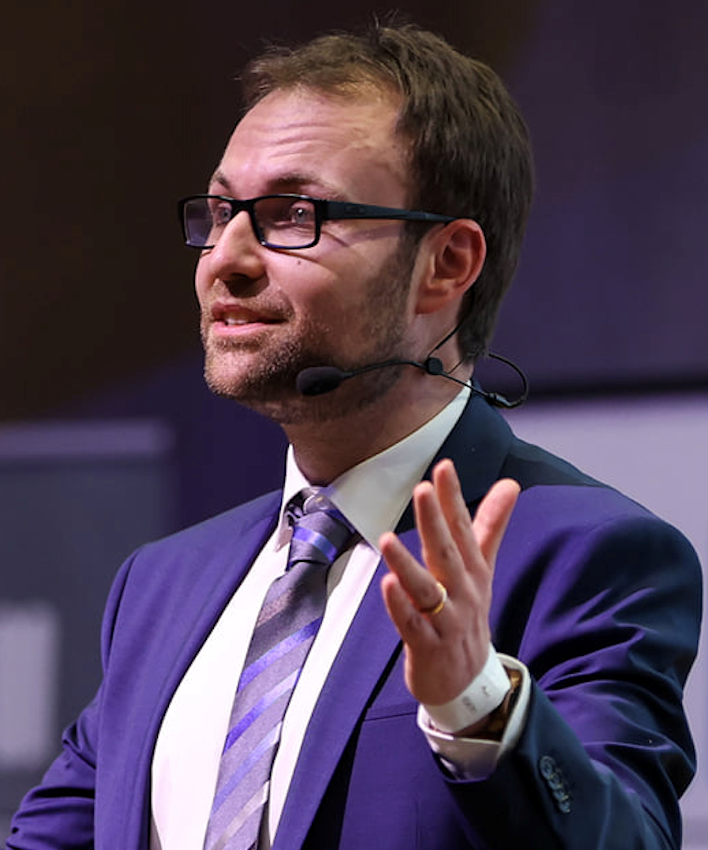
Christophe Ley is Professor of Applied Statistics at the University of Luxembourg and co-founder of GrewIA, a company offering comprehensive tailor-made training and innovative consulting solutions in Artificial Intelligence and Data Science. He is currently also President of the Luxembourg Statistical Society, President of ECAS (European Center for Advanced Courses in Statistics) and Editor-in-Chief of the Journal of Sports Analytics. Among his main achievements are the Bernoulli Prize in 2024, a Teaching Award at the University of Luxembourg in 2024, and the 2014 Marie-Jeanne Laurent-Duhamel Prize for the best PhD thesis in statistics among all french-speaking universities worldwide over a period of three years.
Luca Splendore Di Gennaro researched political regimes and official statistics as a Marie Skłodowska-Curie Fellow at the University of Malta. He worked with the National Statistics Office of Malta, the United Nations High Commissioner for Refugees (UNHCR), and Pompeu Fabra University. He has served as a statistical manager for the European Union Election Observation Missions in various countries, including Nigeria, Paraguay, Tunisia, Honduras, Kenya, Kosovo, Honduras, Angola, and Peru.
He has a PhD in Statistics from the University of Bologna, Italy. He has presented at international venues, including the Congreso de la República del Perú, New York University, and the European Parliament.
Dr. Shalise Ayromloo is a Senior Economist at the U.S. Census Bureau and leads a seminar series on Machine Learning and Artificial Intelligence. She holds a Ph.D. in Applied Microeconomics from the University of Illinois at Chicago and applies her expertise to ensure the production of high-quality data products and infrastructure that can be used by the public, academics, and policymakers to address pressing economic and policy challenges.
Dr. Ayromloo’s research examines important questions such as how labor demand shocks shape attitudes, how unbanked households engage with the tax system, and how randomized monetary incentives influence income reporting. Beyond her research, at the Census Bureau, she is modernizing the programming, data management, and modeling of data products, ensuring the agency delivers high-quality, timely, and relevant data. Once such effort focuses on reducing nonresponse rates in household and business surveys, using advanced data linkage and modeling techniques to enhance contact information accuracy and survey participation.
Her work at the intersection of economics, machine learning, and data science is shaping the future of how the U.S. Census Bureau collects and analyzes data, reinforcing its roles as a global leader in official statistics and public data infrastructure.
BOOK OF ABSTRACTS
This is the latest draft version of the Book of Abstracts for NTTS 2025. We kindly ask authors to review their abstracts, and if any critical issues are identified, please do not hesitate to contact us at ESTAT-NTTS@ec.europa.eu .
Your understanding in addressing only essential corrections is greatly appreciated to ensure a smooth finalization process.
DOWNLOAD THE BOOK OF ABSTRACT HERE <-------------
AN INCLUSIVE, DIGITAL AND GREEN EVENT
In a world where technology shapes our lives, we believe it's vital to include every voice. NTTS2025 is more than just a conference; it's a melting pot of ideas, cultures, and perspectives. We're ensuring that everyone feels welcomed and valued. Our commitment to inclusivity isn't just about who attends, but how they experience and contribute to the event. From keynotes to panels, every aspect of NTTS2025 is designed to be a reflection of the diverse world we live in.
Sustainability is a core principle for us. At NTTS2025, we're integrating eco-friendly practices at every level. From minimizing waste to choosing sustainable materials, we're dedicated to reducing our environmental footprint. Our green initiatives extend to our choice of venue, catering, and even the way we manage energy consumption throughout the event.
The event will be webstreamed live.
SCIENTIFIC COMMITTEE

Sophie Limpach (Chair, European Commission – Eurostat)
Sophie Limpach is currently Director in Eurostat in charge of the Resources Directorate since 16 January 2024.
She was appointed Director by the European Commission on 1 March 2019 to lead the Business and Trade statistics Directorate within Eurostat.
She had been working in Eurostat since 2001 first as administrator in budget and human resources and then as Head of Unit in several areas of business and trade statistics (e.g. short-term business statistics, tourism statistics, international trade in goods statistics, production of manufactured goods statistics).
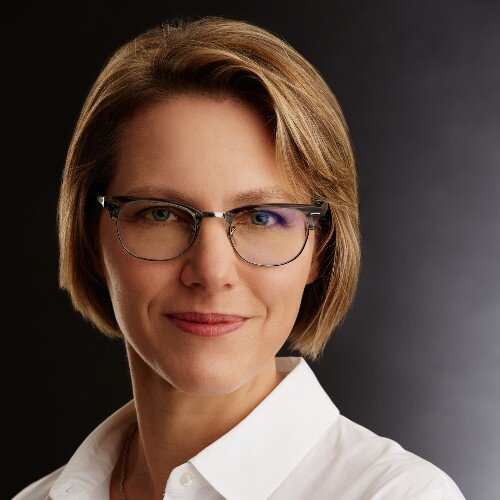
Mojca Bavdaž (University of Ljubljana)
Mojca Bavdaž is Associate Professor at the School of Economics and Business, University of Ljubljana. She is a member of the Methodological and Statistical Councils at the Slovenian National Statistical Institute and a former member of the EMOS Board. Her main research areas include measurement in economics and related data collection. She is also interested in dissemination, visualization and use of official statistics data.
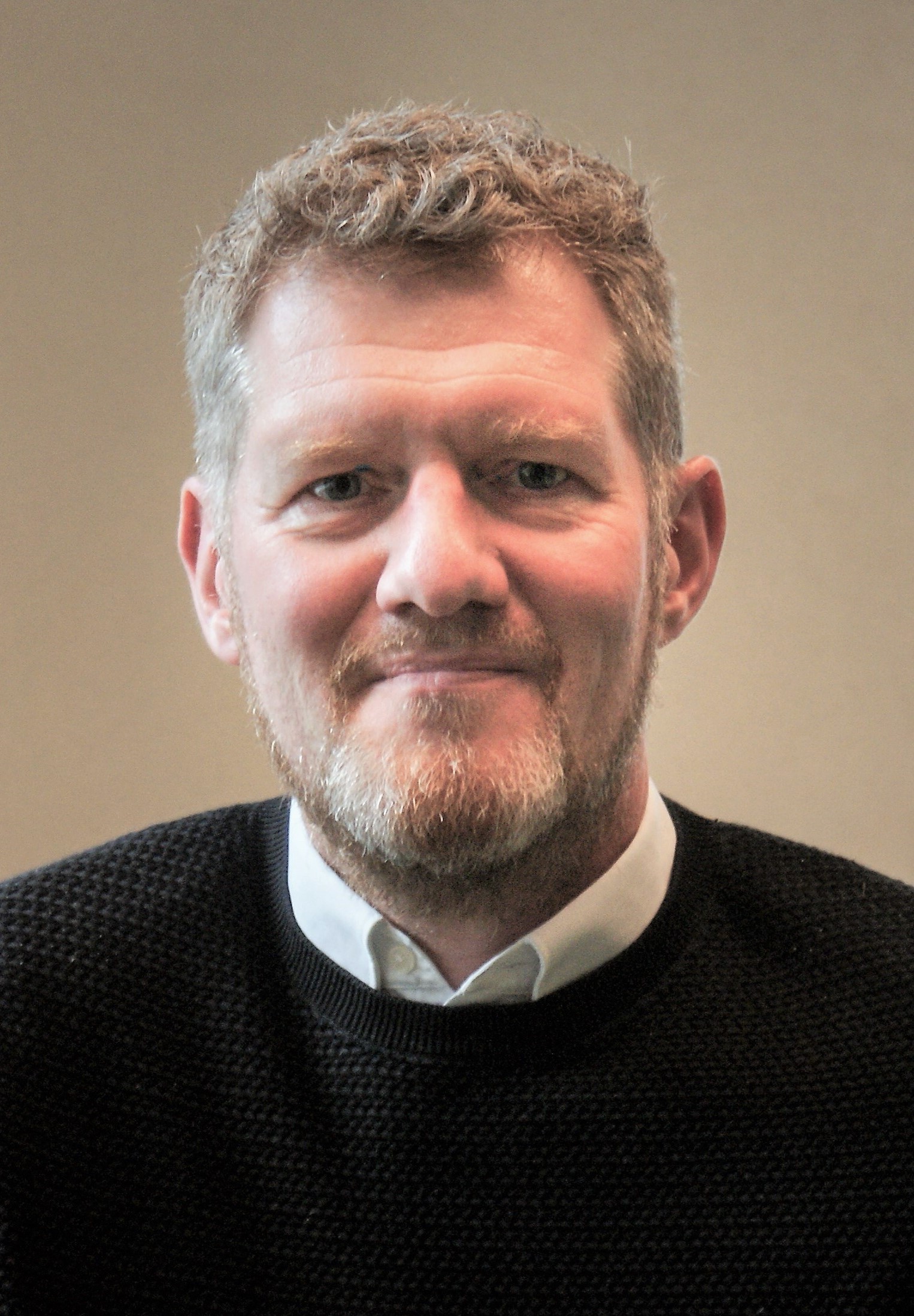
Roeland Beerten (National Bank of Belgium)
Roeland Beerten is chief statistician at the National Bank of Belgium where he heads the statistics department, with responsibility for national accounts and financial statistics.
Annamaria Bianchi (University of Bergamo)
Annamaria Bianchi completed her double PhD in Mathematics and Statistics for Computational Sciences at the University of Milan and in Sciences Mathématiques at the University Paris 6 in 2007. She is a survey statistician with interests in non-probabilistic methods for data collection and inference, the use of social media data to enhance survey research, adaptive survey designs, representativity indicators, and online panels and web surveys. She is also reference professor of the EMOS programme at the University of Bergamo. Since 2023 she is member of the Executive Committee of the International Association of Survey Statisticians (IASS) of the International Statistical Institute (ISI). Since 2024 she is member of the Board of the European Master in Official Statistics (EMOS).

Francesca Kay (NSO, Ireland)
Francesca joined the Office for National Statistics (ONS) in 2011, where she was the Director of both the Economics Statistics and Census and Data Collection Transformation programmes and was appointed as interim Director General for Data Capability at the ONS in 2019, covering technology, data, methodology and data science. Francesca moved to the Central Statistics Office in Ireland in 2020, where her current role is Chief Information Office with responsibility for technology, methodology, data science as well as population and vital statistics. She is also leading a EU consortium for the creation of a One-Stop-Shop for AI/ML in Official Statistics.
Alexander Kowarik (Statistics Austria)
Dr Alexander Kowarik is head of the methods unit at Statistics Austria with more than 15 years of experience working at an NSI. He is an active contributor to the R open-source community with a focus on official statistics application and participating in several international projects related to the usage of new data sources for the production of official statistics.

Diego Kuonen (Statoo Consulting & University of Geneva)
Prof. Dr. Diego Kuonen, CStat PStat, founded Statoo Consulting in 2001 and advises and consults businesses and government bodies in Switzerland and across Europe at the operational, tactical, and strategic levels on analytics and data science, including artificial intelligence and machine learning. He is also Professor of Data Science at the Geneva School of Economics and Management (GSEM) at the University of Geneva, Switzerland, and Founding Director of GSEM’s new Master of Science in Business Analytics program.
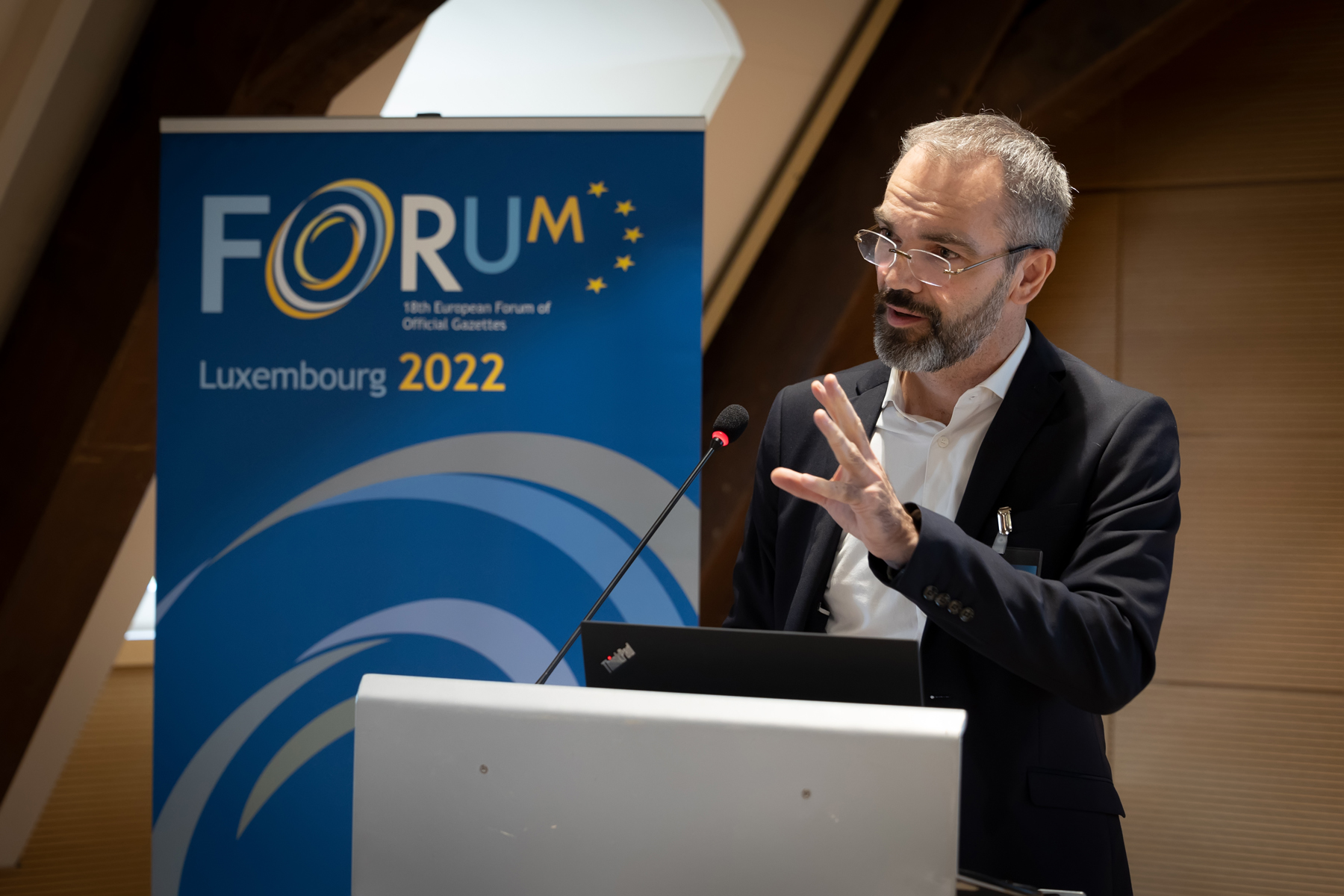
Franck Noël is director for Data, Information and Knowledge Management Services at the Publications Office of the European Union. Franck has 30 years of experience in information technology, artificial intelligence and digital transformation in both the private and public sectors.
Dominika Nowak (Statistics Poland)
Dominika Nowak joined Statistics Poland in 2015. She is Head of Unit, Experimental Research and Analyses. She leads experimental research projects on the use of new data sources in official statistics, in particular, web data and administrative data. In addition, she has been involved in data science and big data capacity building, as well as modernization projects, both, at Statistics Poland and internationally.

Serena Signorelli (JRC)
Serena Signorelli works as project officer at the Joint Research Centre (JRC) of the European Commission. Her current focus is on the topic of Inclusive Data Governance as part of the Digital Economy Unit, while she previously acted as data steward for the project Computational Social Science for Policy, part of the JRC Centre for Advanced Studies.
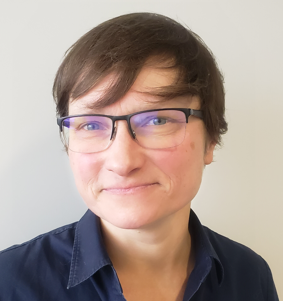
Anna Smyk (INSEE)
Time series methodologist at Insee (French INS).
Working on Seasonal Adjustment tools and methods, and mainly on JDemetra+ software, providing methodological support and training on seasonal adjustment and assistance in building production processes of seasonally adjusted data. Currently, in charge of the production of JDemetra+ v3.x online user documentation.
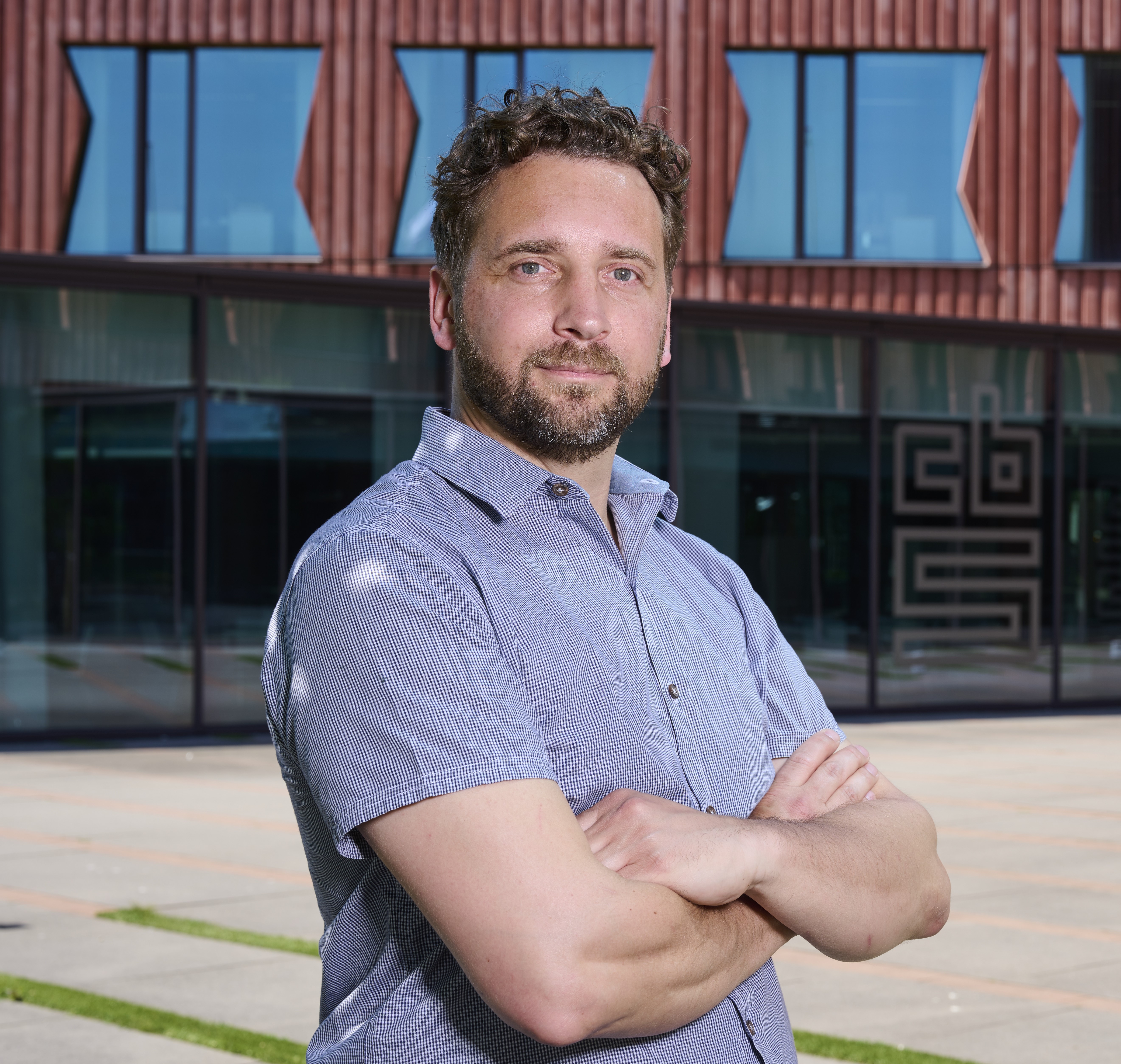
Mark Van der Loo (CBS - Statistics Netherlands)
Mark van der Loo is a senior methodologist at Statistics Netherlands (CBS) and a Research Fellow at the Leiden Institute for Advanced Computer Science at Leiden University (LIACS). His research interests cover a broad range of topics in the areas of methodology and statistical computing.
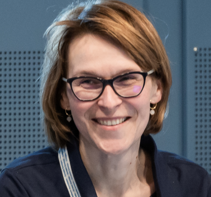
Monika Wozowczyk (Eurostat)
Deputy head of the unit for methodology and innovation in official statistics at Eurostat. The unit provides methodological support for official statisticians across the EU, manages the European Master in Official Statistics and the European Statistical Training Programme, and organises access to confidential data for researchers.
Markus Zwick (Destatis)
Markus Zwick is Head of the Institute for Research and Development in Federal Statistics of Destatis. He is engaged in different national and European projects concerning the implementation of new digital data sources into official statistics. Markus Zwick has been working at Destatis since 1996.
ORGANISING COMMITTEE

Albrecht Wirthmann (Chair)

Cristiano Tessitore (Logistics)

Dario Buono (Programme)
Ph.D. in Economics, at Eurostat since 2008, currently Team Leader of Methodology, EMOS (EMOS dashboard | Eurostat CROS (europa.eu)) and ESTP (ESTP dashboard | Eurostat CROS (europa.eu)). Expert/Trainer in Time Series Econometrics, VAR modelling & Macroeconomics Forecasting. Research interests include measures for uncertainty around point estimates and use of LLMs and AI for Official Statistics.

Francine Kessler (Administrative Support)
European Commission, DG Eurostat - Unit A5 - Methodology; Innovation in official statistics
«European Statistical Training Programme» (ESTP)

Klara Pavlikova (Blue Book Trainee)
Graduated from Charles University in Prague with a Master’s Degree in International Relations. Worked as a Foreign News Desk Journalist at the Czech Radio followed by an internship at the Czech Embassy in The Hague. Previous experience in organizing international conferences on Smart City, Innovation, Digitalization and Sustainability at the municipal joint-stock company OICT.
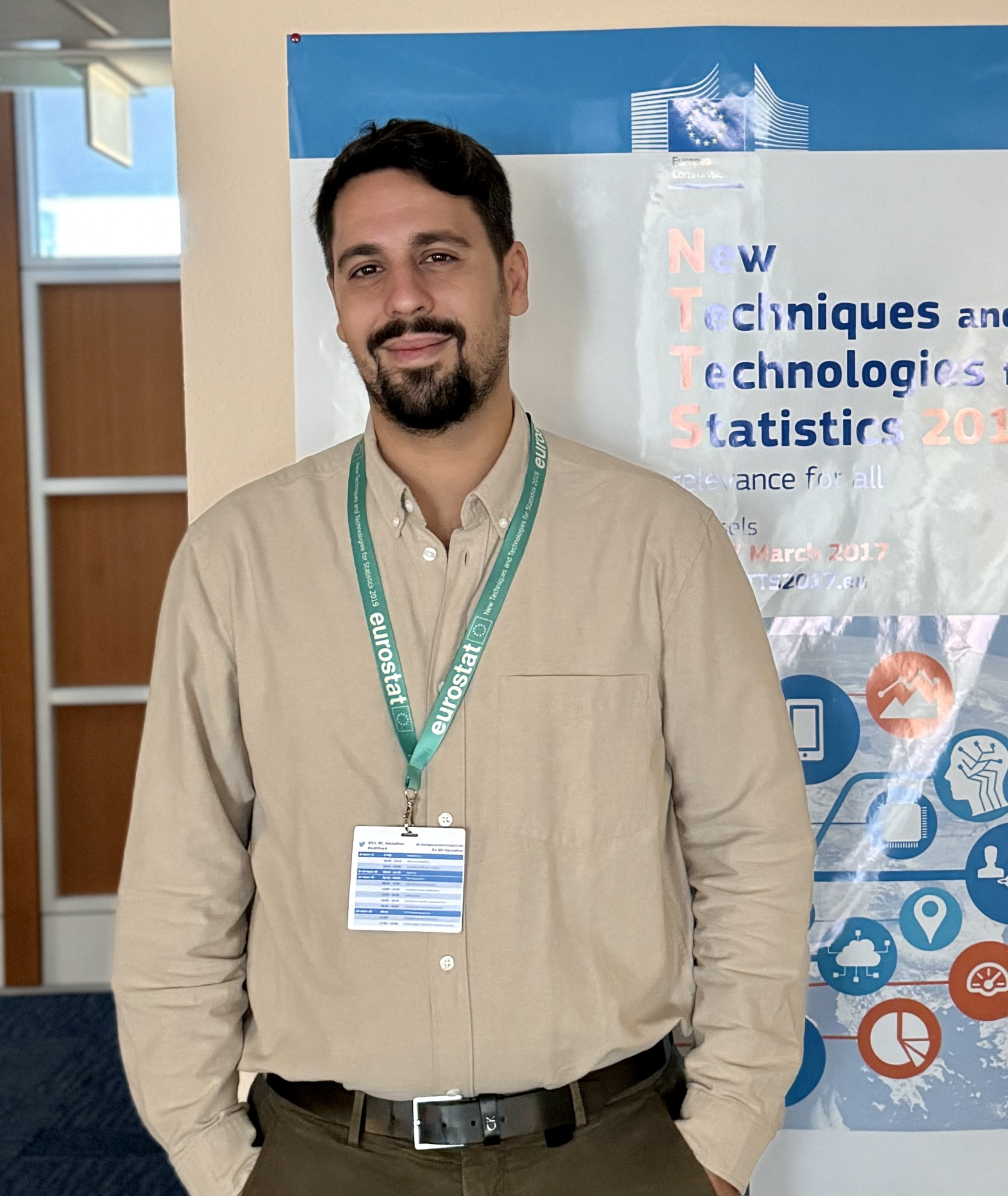
Luigi Di Razza (Web Management and Social Media)

Maria Isabel Lazaro External and interinstitutional relations. Communication at European Commission (Eurostat)
Tina Steenvoorden (EMOS Master Thesis Competition)
KEY DATES
Call for sessions (now closed): 4 March to 24 June 2024
Opening Call for abstracts (now closed): 1 June 2024
Notification of acceptance - Sessions (now closed): 31 July 2024
Deadline for submission of abstracts (now closed): 30 September 2024
Registration opening (now open): 16 October 2024
Notification of acceptance - Abstract: 16 November 2024
Registration deadline: 15 February 2025
Please note:
- the accepted speakers are expected to participate in person to the event in Brussels
- The NTTS2025 event is free of charge for participants
TRACKS AND TOPICS*

TOPICS BY TRACK:
Track A. Data collection and integration: Mixed-mode and web data collection; Adaptive and responsive survey designs; Non-response and response burden; Measurement of longitudinal phenomena; Multi-source statistics: data integration, inference, and data quality; New challenges in the measurement of vulnerabilities (economic insecurity, inequality, poverty); Use of administrative data and integrated statistical registries.
Track B. Innovation in Statistics –key drivers and opportunities: Management of innovation: from innovation (“Lab”) to statistical production (“Fab”); Non-traditional data sources including innovative statistical methods and quality aspects; Edge computing; Smart Surveys; Privacy preserving technologies applied to official statistics; Applications of complexity theory and network science; Blockchain, distributed ledgers and smart contracts applied to official statistics; ESS (European Statistical System) innovation agenda and network; Experimental statistics and statistics under development; Collaborating with private sector and academia.
Track C. Data analytics revolution: Data analytics for unstructured information; Generative AI; Artificial Intelligence in the context of official statistics; Semantic web; Natural language processing, large language models and large multimodal models; Machine learning; Synthetic Data; Skills and educational approaches for tomorrow’s official statisticians; Social data mining; Crowdsourcing and citizen statistics.
Track D. Estimation and analysis: Nowcasting and flash estimates; Time series analysis and revisions; Outlier detection; Seasonal adjustment; Econometric modelling; Variance estimation; Small area estimation; Microsimulation; GIS (Geographic Information Systems), regional and spatial statistics; Data Validation.
Track E. Dissemination, data reuse, communication, and users' outreach: Communicating uncertainty of official statistics; Visualization tools and infographics; Data storytelling; Collaborative and participative analytics; Methods for capturing user input, assessing user needs and user satisfaction; Statistical literacy in the data age; Public trust in official statistics; Statistical disclosure control, confidentiality, and privacy; Metadata; Data platforms and data-as-a-service; Technical and legal aspects around the use of confidential data of official statistics, GDPR (General Data Protection Regulation); Open data; Multinational repositories and exchange/share/use of microdata.
Track F. Evolving Data ecosystem: New roles for Statistical offices including data stewardship models; Digital economy, digitalization (data from financial sector, health, environment, etc.); Sustainable use of natural resources; Ethics, digital skills, cybersecurity; Statistical systems in developing countries – opportunities and risk from alternative methods; Data policies and governance; Use of privately held data for public purposes; Data spaces.
Track G. IT infrastructure, software, and tools: Open frameworks for replicability and reproducibility; Use of R in official statistics; Use of Python in official statistics; Open source and sharing codes (GitHub, etc.); Reusing tools and services; Applications of enterprise architecture and standards; Data architecture; Continuous integration and continuous deployment pipelines.
PRACTICAL INFORMATION
For your inquiries, please contact the organizing committee at:
THE CHARLEMAGNE BUILDING
To access the Charlemagne Building (Rue de la Loi 170, B-1000 Brussels), please bring:
• The same document you used during registration (ID or passport).
• Your email confirmation of registration, including the QR code.
• EU institution employees are kindly requested to present their badge.
Additionally, all participants, including EC employees, must pick up their conference badge upon arrival.
How to get to Charlemagne Building (address: Rue de la Loi 170, B-1000 Brussels):
From Airport: Brussels Airport Zaventem
Transfer by Bus: There is a convenient (approx 3 Euros) shuttle bus (Line 12)
from the airport to the City, get off at Schuman (approx 30 minutes). From the
Schuman stop, walk along Rue de la Loi (Wetstraat). The Charlemagne building
is on the righthand side.
Transfer by Taxi: A taxi from the Airport takes about 20 minutes and costs about
30 Euros.
Transfer by Train: Take the shuttle from the airport to the Centre of Brussels to
Central Station (Gare Centrale). The trains leave in intervals of approx. 15
minutes and cost 2.8 Euros. Then follow the instructions from the Train Station,
via the Metro to Schuman.
From Train Station:
Central Station (Gare Centrale) via Metro to Schuman At the Gare Centrale take
the underground (Metro) in the direction of Stockel or Herrmann-Debroux. 5 stops
on, leave the metro at Schuman From Schuman, walk along Rue de la Loi
(Wetstraat). The Charlemagne building is on the right-hand side.
South Station (Gare du Midi) via Metro to Schuman. At the Gare du Midi take
the underground (Metro 2) in the direction of Simonis and change at Arts-Loi
(Kunst Wet), take the underground (Metro 1) in the direction of Stockel or
Herrmann-Debroux. 5 stops on, leave the metro at Schuman. From Schuman,
walk along Rue de la Loi. (Wetstraat). The Charlemagne building is on the right-hand
side.

